Forbidden Fruit (27 page)
Authors: Annie Murphy,Peter de Rosa

Progression of the house that Annie and Arthur bought and rebuilt.
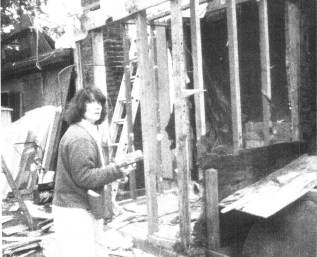
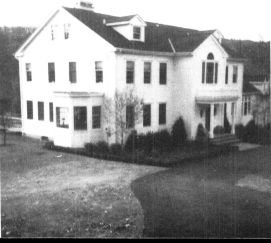
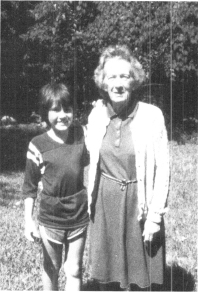
Nine-year-old Peter with Grandma Hannah Murphy.
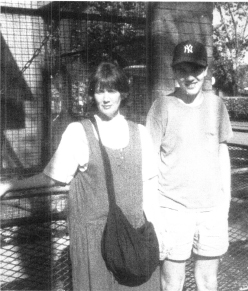
Annie and Peter.
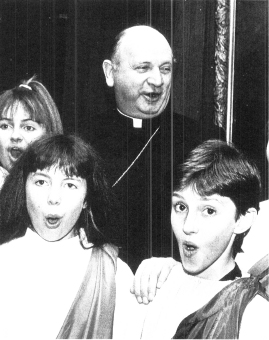
Eamonn singing with other children, c. 1985.
(The Irish Times)
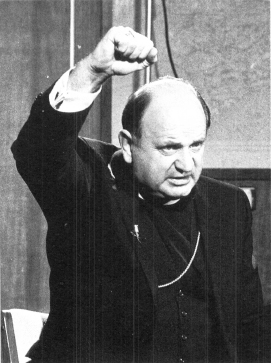
Eamonn giving a speech on Central American issues, c. 1983. (
The Irish Times
)
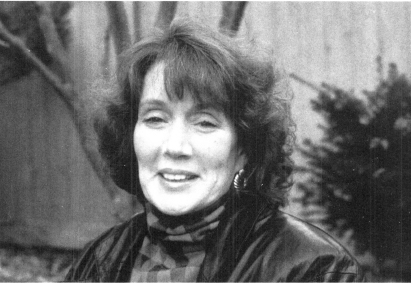
Annie today.
I stood up and held out my hand. He took it and I led him to the bed, helped him get in, and climbed in next to him.
“I really love you, Annie, but I’m scared.” I touched his lips to show I did not like that last word.
“I feel as if I have been taken over by a force I can’t master.”
“Talk about it,” I said.
He told me how he was recently at an important meeting—millions of pounds of European Community grants at stake: “And, boom,
Annie, you come into my mind. Suddenly, someone coughs—‘Bishop’—and I come to, unaware of anything said for perhaps five
minutes. And, Annie —”
I felt honored. “Yes?”
“Even at Mass, I think of you.” He was lost, muttering something about even Judas had the decency not to turn up on Calvary.
I was the last to make up his mind for him. As soon ask a sheep the way to the slaughterhouse. But my reluctance to speak
was due only to my profound respect. I loved him but I could not tell him whether he should love me or not. I could not take
responsibility for him giving up a lifelong calling however unsuited to it he was. I could not tell him that he had only to
change his thoughts, and his love for me would seem a sign not of weakness but of strength.
My role was to support him in whatever he decided to do. Even to say “Send me away, Eamonn, and I’ll go” would be to apply
the wrong sort of pressure. My silence devastated him. He blamed me for not providing an answer that only he could give. Did
he want me to change water into wine by giving him back his innocence?
In years to come, I might regret my silence. I could have said that what we had done had made his life as a cleric impossible,
especially if I was carrying his child. I could have begged him to swallow his pride and choose one of several alternatives.
I could have come right out with “Eamonn, you might be celibate but you cannot be chaste; not because you are weak but because
you were abused as a child by the imposition of a mistaken piety.”
I had still to ask myself the most difficult questions.
Suppose he came away with me—would we be happy, as happy, I mean, as we had been at Inch?
Could I bear to see him stripped of his titles and banished from his Cathedral, see him exchange his bishop’s robes for a
collar and tie and executive suit?
Could I bear to see him lose the respect due him as a priest from his father, friends, the public at large?
Above all, could I bear to see him abandon his special role as provider for the hungry in distant lands?
Our life together had so far taken place in a world of ambiguity and make-believe. That had made it dangerous and almost mystical.
Could we bear the humdrum nine-to-five job, the commuting, the heavily mortgaged house in suburbia, the quiet nights in front
of the television—after we had lived inside a magic bubble?
What if our love was beautiful precisely because it was destined
not
to last? Oh, God, what if he left the priesthood and came away with me and, when the dream within a dream dissolved, we awoke
to unreality and found ourselves strangers? “Who am I? Who are you?”
Having refused his offer to speak, from then on I was at Eamonn’s mercy. But if I could not rely on that, what point was there
in living anyway? For an hour or more we lay side by side, holding hands, not speaking a word, in dread.
While he fixed us a meal, I went into my bedroom to unpack my few things. I opened the curtains to let in the pure rays of
the cloud-peeled moon. I saw in silhouette the mountains, their peaks like motionless horsemen; I heard waves pound the shore.
How good to look at and listen to timeless things. How many sorrows felt to be unendurable had happened here at Inch under
the watchful eyes of those mountains, against the soothing sounds of that sea, and all their pain had passed?
I played Eamonn the Chieftains’ tape, “Playboy of the Western World,” after which we slept in his bed and woke up about two.
He fetched himself a brandy and a cup of tea for me. Eamonn the vulnerable turned into Eamonn the suspicious.
I had not told him I had used Bridget as my confessor but he was afraid that if she became my flatmate, she might wonder what
he was doing on his visits. “She’s as tough as old boots, Annie. An old thirty. And you could not fart, excuse me, without
her knowing. Even if you did it silently she would see your skirt move that fraction of an inch.”
He told me not to drink too much with her around, and I assured him I had given that up.
“Has she a boyfriend?”
I told him the name and the fact that he was a hurling player and also the security officer at the Burlington.
“An ex-cop,” I said. “A detective. He drinks.”
“God
Almighty
, Annie, I’ll check him out. That flat’s been leased in my name. It could become a gin hall.”
He rubbed his head and his stomach.
“You don’t seem to realize, Annie, your beauty would shame a rose and you are very, very sexy. You could be raped.”
“Thanks for the kind word.”
He also feared Bridget might persuade me to date. “If you did meet somebody else,” he said, in a mournful tone, “you mustn’t
consider me.”
“Of course not, Eamonn.”
He instantly demanded, “Of course not,
what
?”
His jealousy irritated me. I was even faithful to my favorite pair of jeans. I wore them practically till disgrace did us
part. Could I discard my perfect love in favor of another? I said, “You fear for me in wicked Dublin? That’s rich coming from
the Playboy of the Western World.”
“Who? Me?” he gasped. “What do you mean?”
“I mean your new Lancia and you wearing devilish red tights and misbehaving in a Dublin gravel pit so even the cops have to
flush you out.”
“Don’t joke me, Annie. Bridget living in the flat could be far more dangerous than what happened in the gravel pit.” He calmed
his fears with a second helping of lovemaking.
Next morning, he left at nine, saying he would not be back till midnight.
I spent the day in a restless mood. I went out onto the lawn. Season of frugal beauty. A day of whitewashed skies and heavy-lidded
sunshine, the light brassy where the sun should have been. A needlepointed wind pricked my cheeks. Somewhere, a dog barked.
From a far-off gully, rain headed my way like a swarm of flies.
Nothing, not even the sere grass, the trees antlered by the fall, the last shabby rose, looked real. Low over the white blossom
of the sea, a guillemot and her young chick were flying happily together when a great black-backed gull appeared and attacked
the chick. The mother made frantic efforts to act as a decoy, and when that failed, she tried to beat him off with her wings.
The gull swooped and swooped, forcing the chick to dip ever lower toward the sea. It was an unfair contest, but I did not
see its resolution because all three birds disappeared around the headland.
That day and for many days after, I kept seeing the mother bird instinctively trying to protect her babe, her joy, her future,
from the vicious black-backed gull.
